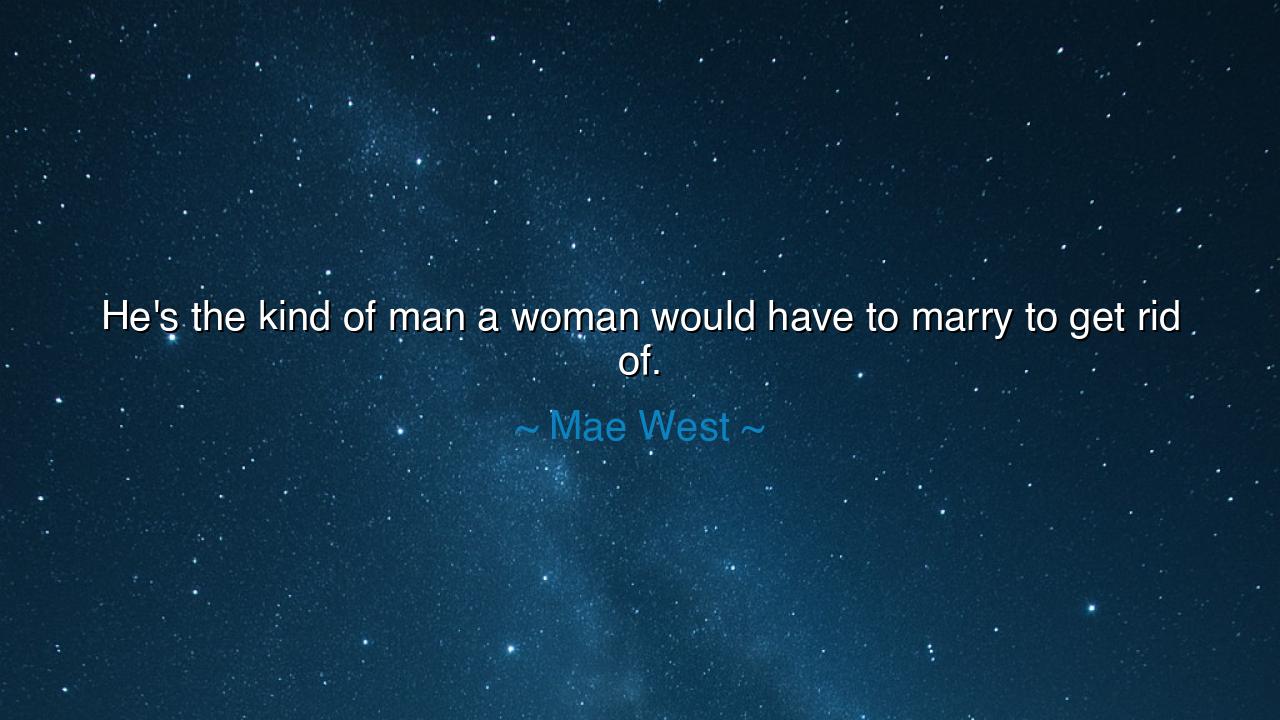
He's the kind of man a woman would have to marry to get rid of.






“He’s the kind of man a woman would have to marry to get rid of.” Thus spoke Mae West, the legendary actress, playwright, and wit whose words sparkled like diamonds—sharp, radiant, and enduring. Beneath her humor, however, lay the wisdom of a woman who understood the tangled dance between love, desire, and freedom. This quote, half jest and half truth, unveils a timeless insight into human nature: that some people are so persistent, so consuming in their pursuit, that only the finality of marriage—or its collapse—can bring escape. It is a quip about men, yes, but even more, it is a reflection on the power dynamics of affection, and the peril of entanglement when charm becomes obsession.
To understand her meaning, one must know Mae West herself—a woman ahead of her time, bold in body and in speech, who refused to be bound by convention. Living in an era when women were expected to be modest, submissive, and silent, she crafted her legend by doing precisely the opposite. She understood the theater of love and the illusion of romance; she knew how passion could captivate, how pursuit could suffocate. Her humor became her sword and her shield—a way to speak uncomfortable truths with laughter. Thus, when she described a man one could “only get rid of by marrying,” she was not simply mocking the suitor, but pointing to a deeper truth: that possession disguised as love is a trap both seductive and suffocating.
The man she describes is not wicked, but relentless—one whose affection, though flattering at first, grows into something inescapable. Such men appear in every age and every tale. Consider Catherine the Great of Russia, whose beauty and wit drew suitors by the dozens. Among them was Grigory Orlov, a soldier of great charm and loyalty. Yet his devotion became so consuming that even the Empress, with all her power, found it wearying. To free herself from his shadow, she granted him riches and titles—her own form of “marriage to get rid of him.” The heart, when unbalanced by wisdom, can cling so fiercely that its love becomes a burden rather than a blessing. Mae West, in her sly way, captures this truth with a single laugh.
But there is another layer to her words, one more profound: the struggle for freedom within love. The woman of whom Mae speaks is not simply trying to flee a man—she is defending her independence, her right to breathe and to choose. The suitor who will not be dismissed often represents the world itself, forever trying to claim and define a woman. To “marry to get rid of him” is a metaphor for surrendering one’s power to end a pursuit that society will not let her refuse. Mae West’s wit cuts through this hypocrisy. Her humor defends the woman’s sovereignty over her heart, even as it mocks the absurdity of those who would chase love to its ruin.
In a larger sense, her quote reminds us that relationships are not meant to be prisons of persistence or games of conquest. True love does not demand possession, nor does it thrive in desperation. A man—or woman—who must be married to be dismissed seeks not companionship but control. Such love, if left unchecked, becomes what the ancients called eros ungoverned, a passion that devours itself. The wise learn that affection must be free to breathe, that love is strongest when it does not need to trap. In this, Mae West stands beside philosophers and poets who, in their own solemn way, taught the same: that freedom and affection must walk hand in hand, or both will perish.
Her humor also conceals compassion. For in mocking the overzealous lover, she reminds us how easily longing can turn to folly. The heart, once inflamed, loses sense of measure. What begins as devotion becomes insistence; what begins as admiration becomes demand. Mae’s laughter teaches us to see through illusion—to recognize when pursuit ceases to be romance and becomes compulsion. Her jest is the medicine of truth, a lightness that reveals the weight of human folly.
So, my listener, take heed of her wit as if it were wisdom from the ancients. When you love, love deeply—but never cling. Let your affection be a river, not a chain. If you pursue, pursue with respect; if you are pursued, do not be afraid to set your boundary. For the freedom to say “no” is as sacred as the joy of saying “yes.” And when you encounter the “kind of man a woman would have to marry to get rid of,” remember Mae West’s laughter—not merely as mockery, but as a song of defiance, reminding every soul that love without freedom is not love at all.
Thus, from the lips of a woman famed for her wit comes a truth as old as time: that the heart, unguarded by wisdom, can become its own snare. Mae West, with her radiant humor, teaches us that laughter may yet be the sharpest blade against folly—and that freedom, even in love, must always remain the truest measure of happiness.






AAdministratorAdministrator
Welcome, honored guests. Please leave a comment, we will respond soon